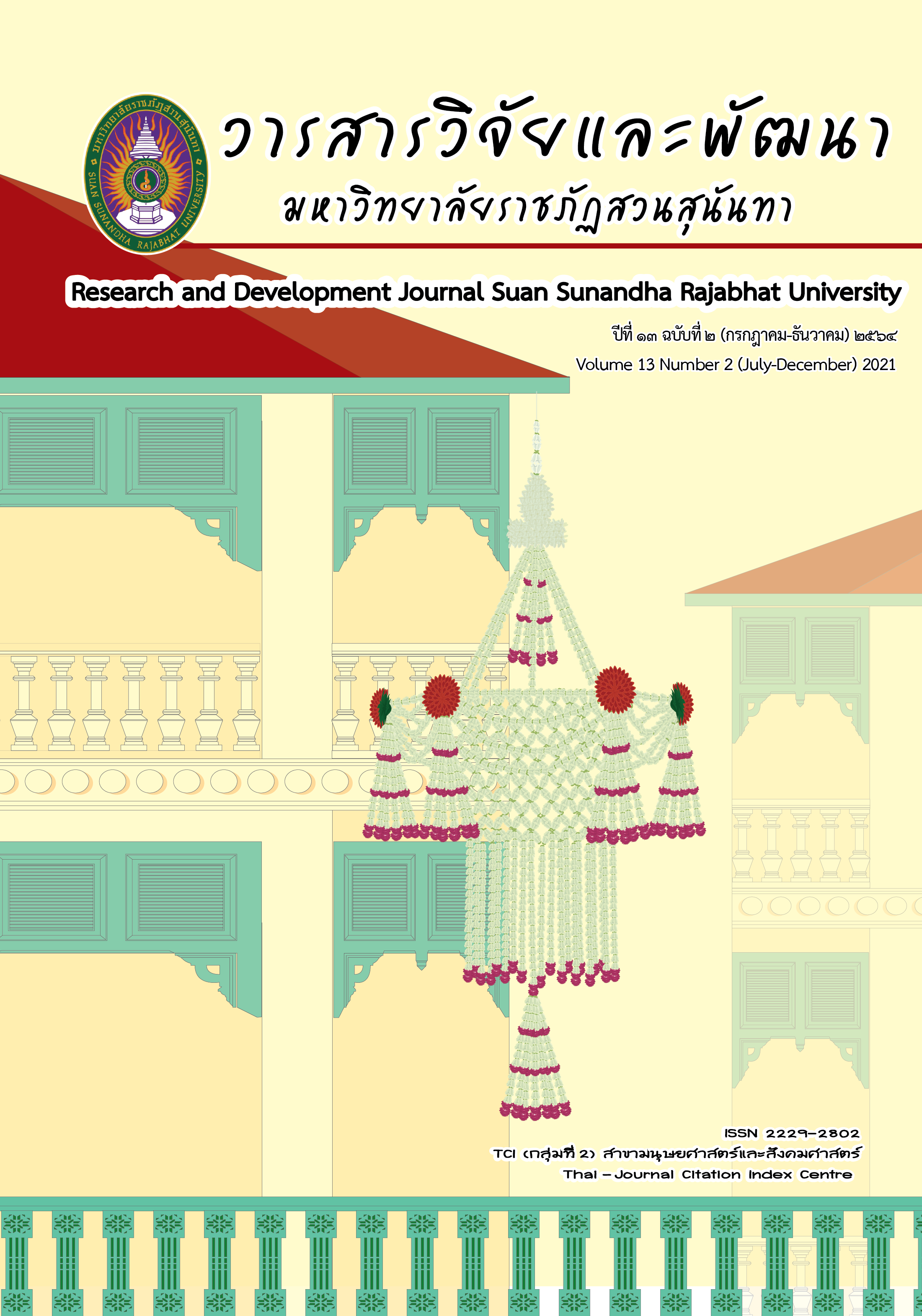แนวทางการพัฒนาการจัดการการท่องเที่ยวบริเวณเขื่อนประเทศไทย
คำสำคัญ:
การพัฒนาการท่องเที่ยว, การท่องเที่ยวเชิงนิเวศ, นักท่องเที่ยวที่มีคุณภาพ, การมีส่วนร่วมของชุมชนบทคัดย่อ
การศึกษาวิจัยแผนงานนี้มีวัตถุประสงค์เพื่อสังเคราะห์ข้อมูลงานวิจัยในการศึกษา 1. ค่านิยมและพฤติกรรมนักท่องเที่ยวบริเวณในเขื่อนประเทศไทย 2. การมีส่วนร่วมของชุมชนในการบริหารจัดการการท่องเที่ยวเขื่อนบริเวณในเขื่อนประเทศไทย 3. การพัฒนาการท่องเที่ยวเชิงนิเวศอย่างยั่งยืนบริเวณในเขื่อนประเทศไทย และนำข้อมูลที่ได้จากการสังเคราะห์มาพัฒนารูปแบบของการจัดการการท่องเที่ยวบริเวณในเขื่อนประเทศไทยเพื่อหาข้อเสนอแนะการพัฒนาการจัดการการท่องเที่ยวบริเวณรอบเขื่อนประเทศไทย ซึ่งจากผลการวิเคราะห์และสังเคราะห์งานวิจัยทั้ง 3 เรื่องสามารถนำพัฒนารูปแบบของการจัดการการท่องเที่ยวบริเวณเขื่อนได้ดังนี้ ในการพัฒนาการจัดการการท่องเที่ยวบริเวณในเขื่อนประเทศไทยจะประกอบไปด้วยกลุ่มผู้มีส่วนเกี่ยวข้อง 5 กลุ่มพันธมิตรการท่องเที่ยว (GBTCA) ประกอบด้วย หน่วยงานภาครัฐ (Government) หน่วยงานภาคเอกชน (Business) นักท่องเที่ยว (Tourist) ประชาชนท้องถิ่น (Community) และแหล่งท่องเที่ยว (Attraction) ซึ่งกลุ่มผู้มีส่วนเกี่ยวข้องเหล่านี้จะต้องมีการจัดการการท่องเที่ยวบริเวณเขื่อนร่วมกันโดยเริ่มตั้งแต่การวางแผน การร่วมมือและการบริหารจัดการเพื่อนำไปสู่การปฎิบัติและการติดตามประเมินผลการปฎิบัติงานได้อย่างมีประสิทธิภาพ
เอกสารอ้างอิง
Aimpan, D. (2004). The guide of ecotourism classification. Bangkok. Text and Journal. (in Thai)
Bangkokbiznews. (2014). Council of ministers have approved tourism as the National agenda. Retrieved March 3, 2015, from http://www.bangkokbiznews.com/news/detail/616914. (in Thai)
Beech, J., & Chadwick, S. (2009). What is sustainable tourism? Retrieved on May 12, 2009, from http://www.gdrc.org/uem/eco-tour/st-whatis.html.
Bramwell, B. (1993). Tourism strategies and rural development. Paris: OECD.
Chashakul, N. (2007). Tourism Industry. Bangkok: Chulalongkorn University Press. (in Thai)
Cherykeewong, U. (2015). Ecotourism. Bangkok: Saengdao. (in Thai)
Chuensangun, A. (2002). Tourism resource management. Bangkok: Sukhothai Thammathirat Open University. (in Thai)
Department of National Parks Wild Animals and Plants. (2015). Srinakarin Dam. Retrieved March 3, 2015, from http://park.dnp.go.th/visitor/nationparkshow.php?PTA_CODE=1039. (in Thai)
Department of National Parks wild animals and plants. (2015). The statistic of tourists in national parks in 2012. Retrieved March 3, 2015, from http://www.dnp.go.th/NPRD/develop/data/stat55/fthai_55.pdf. (in Thai)
Department of National Parks wild animals and plants. (2015). The statistic of tourists in national parks in 2013. Retrieved March 3, 2015, http://www.dnp.go.th/NPRD/develop/data/stat56/fthai_56.pdf. (in Thai)
Department of National Parks Wild Animals and Plants. (2020). The tourist statistics 2020. Retrieved March 3, 2015, from http://webreg.dnp.go.th/park/index3.phpSubmit=1&task=Report19v2&YYYY=2561&type=all&Page=2. (in Thai)
Division of Tourism and Sports Economy (2021). The monthly of number and income of foreign tourists 2012-2020P. Retrieved March 16, 2021, from https://mots.go.th/more_news_new.php?cid=625. (in Thai)
Forest Department. (2005). Ecotourism. Retrieved March 16, 2018, from https://www.dnp.go.th/park/sara/tour/eco.htm. (in Thai)
Meela, N., & Rachaburi, C. (2010). The quality of ecotourists: Case study of the tourist in ecotourist attraction at Ampawa, Samutsongkorm, Faculty of Industrial Education. Bangkok: King Mongkut’s Institute of Technology Ladkrabang. (in Thai)
Nakornthap, D. (2015). The world top destination. Retrieved October 30, 2016, from http://www.savings.chula.ac.th/sav/wp-content/uploads/2015/08.pdf. (in Thai)
National Economic and Social Development Board in North-East. (2013). Sustainable ecotourism on green route: Case study of North-east region. Bangkok: The Office of National Economic and Social Development. (in Thai)
National Economic and Social Development Board. (2014). National economic and social development plan no. 11 (2012- 2016). Retrieved October 30, 2014, from http://www.nesdb.go.th/Portals/0/news/plan/p11/SummaryPlan11_thai.pdf. (in Thai)
National Park. (2002). Head of national park seminar documents. Bangkok: The office of National Resources Conservation, Royal Forest Department. (in Thai)
Peesirikan, N. (2008). Tourism and Sustainable Development (Master’s thesis). Chulalongkorn University, Bangkok. (in Thai)
Phakpot, N. (2002). Tourism resource management. Bangkok: Sukhothai Thammathirat Open University.
(in Thai)
Sakunapat, P., Jirotchapan, W., & Cherykiwong, U. (2011). Ecotourism. Bangkok: Saengdao. (in Thai)
Sananmuang, S. (1997). Local community and the participation in tourism development. Tourism Authority of Thailand: TAT Review, 17(1), 19. (in Thai)
Sarobol, S. (2008). Sustainable tourism of Community. The proposal for adaptation of Thai tourism community. Tourism Authority of Thailand: TAT Review, 3(3), 22. (in Thai)
Silapa-archa, W. (2002). Tourism resource management. Bangkok. Sukhothai Thammathirat Open University. (in Thai)
Singjawala, W. (2011). Development guidelines for standardizing the raft guesthouse in Thailand. Bangkok. Suan Dusit Ratjabhat University. (in Thai)
The Federation of Thai Industries. (2019). The employment of Tourism and Service. Retrieved March 3, 2015, from https://fti.or.th/ftiindex/. (in Thai)
Techaprompan, S. (2002). Eco-Tourism management of the eastern region national parks (Report). Burapha University. Retrieved March 3, 2015, fromhttp://elibrary.trf.or.th/project_content.asp?PJID=RDG4450038. (in Thai)
Thailand Tourism council. (2019). Thailand tourism entrepreneur confidence index. Retrieved March 3, 2015, from http://www.thailandtourismcouncil.org/wpcontent/uploads/2020/01/Newsletter-Q4.2562.pdf. (in Thai)
Tourism Authority of Thailand. (2015). The policy and guideline for ecotourism development 1995-1996. Bangkok: Amarin. (in Thai)
Wattanavong, Ch. (2010). Tourism development guideline for Kaeng Krachan National Park. Retrieved March 3, 2015, from http://www.sure.su.ac.th:8080/xmlui/handle/123456789/12146. (in Thai)
ดาวน์โหลด
เผยแพร่แล้ว
เวอร์ชัน
- 25-02-2022 (3)
- 25-02-2022 (2)
- 22-12-2021 (1)
รูปแบบการอ้างอิง
ฉบับ
ประเภทบทความ
สัญญาอนุญาต
ลิขสิทธิ์ (c) 2021 มหาวิทยาลัยราชภัฏสวนสุนันทา

อนุญาตภายใต้เงื่อนไข Creative Commons Attribution-NonCommercial-NoDerivatives 4.0 International License.
บทความที่ได้รับการตีพิมพ์เป็นลิขสิทธิ์ของ สถาบันวิจัยและพัฒนา มหาวิทยาลัยราชภัฎสวนสุนันทา
ข้อความที่ปรากฏในบทความแต่ละเรื่องในวารสารวิชาการเล่มนี้เป็นความคิดเห็นส่วนตัวของผู้เขียนแต่ละท่านไม่เกี่ยวข้องกับมหาวิทยาลัยราชภัฎสวนสุนันทา และคณาจารย์ท่านอื่นๆในมหาวิทยาลัยฯ แต่อย่างใด ความรับผิดชอบองค์ประกอบทั้งหมดของบทความแต่ละเรื่องเป็นของผู้เขียนแต่ละท่าน หากมีความผิดพลาดใดๆ ผู้เขียนแต่ละท่านจะรับผิดชอบบทความของตนเองแต่ผู้เดียว





